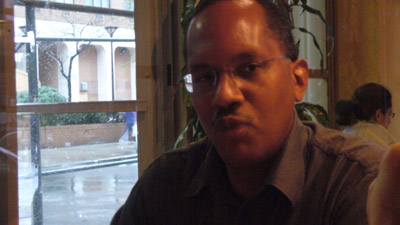|
|
 |
| CEF participant Francisco Acosta, Internal Business Consulting |
But if you're like the consultants who attended our Consultant Entrepreneur's Forum on Friday, September 15th, you get bored with any one topic. Especially once you've mastered everything you've always wanted to know about that topic. As incredible as it sounds, it's entirely possible to exhaust every tangent of your designated specialization, however, it is impossible to do it during every waking hour of your tenure with a project or a firm. This report consequently takes the perspective that you can actually consume what you want when you're ready to consume it, without losing any of your ability to retain that which qualifies you as an expert.
In other words, you can master event marketing in your twenties, advertising and media in your thirties, brand strategy in your forties, and become a full-fledged marketing master in your fifties, all while simultaneously mastering HR, operations, perhaps economics and ecology, and maybe sprinkle some mastery over history and technology. In fact, because a knowledge worker is theoretically always learning, he can learn everything during his lifetime so that in his fifties, he's not a specialist, but a generalist.
And it is when he's a generalist that he has reached a level of professional advice-giving akin to being a jedi master, a level that regardless of the situation he finds himself in, he'll survive and relish the challenge to utilize his entire breadth of know-how. Now, what's wrong with being useful anywhere anytime and being enthusiastic about being useful? Unlike a specialist who's only called to do a specific choir, the generalist is usually the one doing the calling.
The Problems With Specialization
 |
| CEF participant Carl Reid, Savvy Intrapreneur |
The concept of specialization makes sense as a business, when a group of very bright people require a chain of command based on level of intellect. However, it doesn't make sense as an individual, which explains why most professionals often feel so underutilized in their professions they can easily moonlight as actors, musicians, historians, or even entrepreneurs.
A business profits when it can easily replicate a process. Its costs, even when that process entails knowledge, diminish with every additional implementation. This is textbook economics. The irony is that with every additional implementation, the individual's interest also diminishes. This is behavioral economics.
There is an undetermined (but quantifiable) loss of productivity when interest and enthusiasm diminish. So, despite applying the same process in a string of consecutive engagements, and always keeping "busy", the process will become mechanical enough to codify and train others on (which is what the business wants, when it has a good system for capturing this knowledge, of course) and allow the consultant to create a routine-like method so he can find the time to do other things he finds more interesting.
Two side-effects of this phenomenon are that a) a business will inevitably sell less implementations than they planned during the tenure of that specialist as that specialist methodologizes their work to harvests increasingly more personal time and b) the tenure itself will inevitably be cut short as the consultant decides to move on professionally, disrupting the anticipated revenue stream from his particular specialization.
Expressed mathematically, if R=revenue, S=cost of training and paying the specialist, and P=profit, then this latter scenario may potentially look like,
R-S=P-S(squared)
where the cost of replacing a specialist, being so high because they are, after all, a specialist with specialist knowledge, nearly doubles when that specialist gets bored and moves on. Whatever the profit margin, it's obvious it quickly vanishes unless you charge your clients exorbitant amounts of money for your consultants.
The former side-effect may look like,
R-S=P-S-1
where there is an incremental, but growing, diminishment of productivity and profit, as consultants gradually routinize their knowledge so they can find more time to do other things for themselves. After all, a simple cost-benefit analysis will quickly help a consultant recognize that it makes no sense to surrender a 6-figure salary once they find the loopholes to a job.
A business' solution to this side-effect is either
a) an "up-or-out" culture, where competitive peer pressure leads to the elimination of the least "productive" or profitable consultants or
b) on the other side of the spectrum, forced job rotations where consultants are moved into new roles in order to keep them interested in some aspect of the whole organization.
Often disguised as a positive to grant the consultant a wider experience base, now you know it's not really done for the benefit of the individual consultant than for the benefit of the business that is unable to capture knowledge, so they shuffle it (the knowledge) around hoping it'll linger long enough to be fully utilized again when they need it, as opposed to when that consultant wants to have it utilized.
How a Business Can Profit From Generalist Consultants
 |
| CEF participant Derrick Rome |
The professional underutilization
isn't merely the result of an organization without a robust job position, poor
training, or lack of business, but a consultant's own limited timeframe during
which they are most receptive to doing a single task, activity, or job (![]() 1).
This timeframe is when the consultant's capacity to produce is at its highest,
and unfortunately for the business, can't be timed for when the business has
business or when their specialization is required.
1).
This timeframe is when the consultant's capacity to produce is at its highest,
and unfortunately for the business, can't be timed for when the business has
business or when their specialization is required.
In fact, the interest is recurring throughout a consultant's tenure with an organization. It is up to the business to identify that interest and utilize the consultant when this interest resurfaces, which is undeterminable and varies across demographies, so that two consultants of the same age and similar backgrounds will assume an interest at different intervals.
Due to the absurdly unbusiness-like nature of this phenomenon, the only way to manage and maximize profit from this rabble of bright and bored consultants is to permit them to generalize. Permitting generalization doesn't assume any training costs because presumably, every consultant is intelligent enough to teach themselves, given enough information and peer-learning dynamics. (In fact, any "training" period within any professional service firm is a misnomer because professional service firms don't hire dummies. A label more reflective of what this period is all about should be "indoctrination" period.)
But more than this, compensation
and rewards should be changed to encourage generalization, so in effect, every
consultant on staff is a "Navy SEAL Green Beret Special Forces Commando
Capitalist" who more so than specializing, appreciates that their pay (and
life) truly is dependent on their ability to know as much about everything,
rather than a specialty which can easily be expendably plugged in where gaps
are missing, discarded when obsolete, and utterly dependent on someone else's
willingness to pay for that specialty (![]() 2).
I don't know about you, but I'd rather have a team where everyone knows everything
and no one's intimidated by it, than one where I spend more time babysitting
bodies to impress a client.
2).
I don't know about you, but I'd rather have a team where everyone knows everything
and no one's intimidated by it, than one where I spend more time babysitting
bodies to impress a client.
(1) What Defines a Management Consulting Firm?
|
|